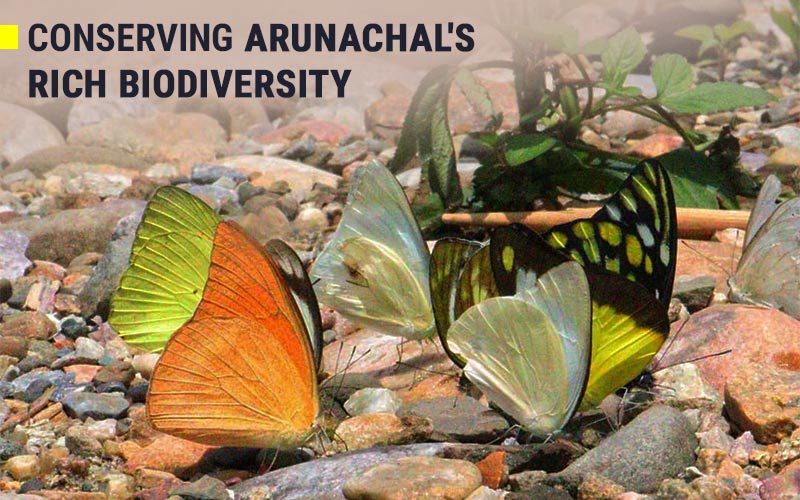
Conserving Arunachal's Rich Biodiversity
Arunachal Pradesh is a state with an abundance of natural resources and rich biodiversity. Researchers from across the nation have been actively uncovering lost and new-found treasures; from reptiles to orchids to ancient artifacts, it is a heaven of undiscovered flora, faunas, and history of the indigenous people.
But, let's stress the fact that with an increase in developmental projects and execution there is a chain increase of demand and supply, which results in a situation where at times there is a compromise to the sustainable development program. However, just as there are two sides to the coin, there is always a positive aspect to everything in the negative i.e. progress call for some sacrifices. However, we will focus on sustainable development practices that we, the citizens, can follow to protect and conserve the prosperous biodiversity of Arunachal Pradesh.
Responsible Citizen
First of all, we, the people of Arunachal Pradesh, must come together and
collectively perform the task of conserving nature by safeguarding and
preserving its natural resources. We should begin the journey to sustainable
living by limiting our consumption as well as wastage of the available natural
resources. It is our responsibility to maintain and abide by the laws that are
specifically rolled out for the protection of the state's environment. Also, we
should not neglect small contributions such as limiting water wastage and fuel
consumption; and keeping the environment clean by not littering
non-biodegradable materials like cans and bottles, cigarette butts, plastics,
metallic products, etc. on the roads, rivers, forests,
tourist spots and other recreational places. Basically, the efficient usage of
natural resources will get us a long way towards sustainability.
Preventing deforestation
Generally speaking, we should avoid cutting down trees, legally or illegally.
Approximately 70% of all forest loss is attributed to agricultural
deforestation, which is the main factor behind vegetation loss. Although a
large proportion of the population in Arunachal Pradesh resides in remote areas
where their active source of cooking, construction, receiving warmth and light
is through woods, as well as farming through slash and burn method for a
livelihood, it is evident that we should raise awareness on the consequences of
such practices. Not only this, a large number of timbers and other valuable
trees that are chopped for trading purposes should be banned altogether. Such
malpractices impact the climate and habitats and may result in various issues
for the indigenous population of Arunachal Pradesh as well as the planet as a
whole. These kinds of concerns should be supervised strictly by the forest
department as well as with the active involvement of the citizens.
Prohibiting illegal poaching and trophy hunting of animals
Arunachal Pradesh is a region that is still in its developing stage, and many of the residents in remote areas are still living a primitive life. In the past, some tribes of Arunachal have been seen hunting exotic birds, wild boars, deer, primates, and other animals for self-consumption, gifting, or trading purposes. However, animals in the wild are an important part of the ecosystem and such practices are no longer evident. Animals and forests play a major role in sustaining ecological biodiversity. Over-hunting of wildlife creatures can risk the extinction of many species under the category of both flora and fauna, which may also alter the ecological system of the environment. Due to extensive hunting and land encroachment, many species have been driven into extinction around the world. Hence, it should be our utmost priority to protect endangered and endemic species by banning hunting and poaching in the wilderness of Arunachal Pradesh. As a civil citizen, supporting local wildlife organizations and abiding by the wildlife protection law will immensely contribute to the preservation of the region's biodiversity.
Encouraging Plantation and Promoting Afforestation
There are plenty of sustainable methods to conserve biodiversity. Integrating plantation of flowers and vegetables as well as introducing new and advanced ways of farming techniques such as alley cropping, combining agriculture and animal husbandry, organic farming, etc. without the practice of slash and burn methods to make fields fertile in the forest can be relatively effective in conserving the environment.
As minor as participating in the plant a tree challenge, adopting a plant, raising awareness on the benefits of reforestation, and contributing to tree plantation events like Clean-Green Arunachal or the Green-Arunachal initiatives, among other things, can support the cause of a sustainable future.
Conclusion
Forests and wildlife play a significant role in the overall welfare of the planet Earth. They have a profound impact on the environment through their part in ecological cycles as well as through their associations with food production activities like seed distribution and crop pollination. We, as consumers and evolved social beings, are obligated to preserve natural resources and maintain our rich biodiversity for a sustainable future.
Because if we don't stop and protect our forests and wildlife now in the context of the points mentioned above, the consequences might have a drastic and direct effect on the planet, such as climate change, desertification, soil erosion, floods, extinction of flora and fauna, food and water scarcity, an increase in greenhouse gas emissions, imbalance in the ecosystem, etc. These are just a few of the issues that can be brought on at the expense of losing trees, wildlife, natural resources, and other vegetation.
Responsibility starts with you.
Disclaimer: The opinions expressed in this article are those of the author's. They do not purport to reflect the opinions or views of The Critical Script or its editor.

Newsletter!!!
Subscribe to our weekly Newsletter and stay tuned.

















Related Comments